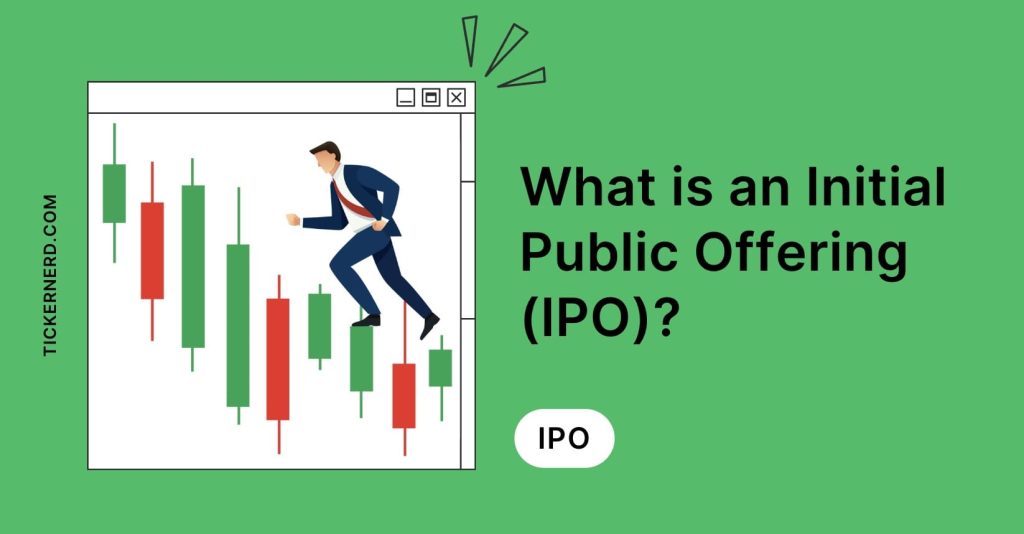Initial Public Offerings are exciting, both for companies and investors.
They allow companies to raise capital to grow and investors to get in on the action.
As an IPO investor, I’m closely watching which IPOs are upcoming and what we can learn from previous IPOs.
In this guide, I will break down what IPO means and how they work.
What is an Initial Public Offering (IPO)?
Before an IPO, a company is considered private, with a few shareholders, primarily early investors like the founders or professional investors such as venture capitalists (VCs) or angel investors. According to US Securities Exchange Act of 1934, section 12(g), private companies can have up to 2,000 accredited investors “held of record” or 500 non-accredited investors. For growing companies, this can be a major constraint.
So a company may decide it is time to go public.
But what does this actually mean?
Well, an initial public offer or the act of “going public” is when a private company offers its shares to the general public (known as retail investors) by listing on a public stock exchange such as the New York Stock Exchange or the NASDAQ.
How do IPOs work?
Step 1: The company decides to go public
This might sound silly, but a company needs to decide whether it wants to go public long before it does. The company must adhere to numerous considerations and obligations, so having early foresight of an IPO is key. The company's board usually makes this decision.
Step 2: Choosing an Investment Bank
Once a company decides to go public, it must engage an investment bank to help navigate and underwrite the IPO. The underwriter's role is to help determine the IPO's initial offering price, buy the company's available shares and sell them to investors. The company may choose one or more underwriters for its IPO.
Companies such as Citi, Credit Suisse, Nomura Sec, and Goldman Sachs have underwritten some of the largest IPOs in history.
Step 3: Due Diligence and Registration
The underwriter (i.e., the investment bank) audits the company's operations, financial conditions, and market conditions. This process is known as due diligence.
The company then files a registration statement (S-1) with the Securities and Exchange Commission (SEC). This document includes detailed information about the company, including its financial statements, details about the IPO, and risks for potential investors.
Step 4: Roadshow
The underwriters and the company's senior management conduct a series of presentations to potential investors, known as a roadshow. The idea is to generate as much interest in the IPO so that there are investors ready to execute before the company lists publicly.
Step 5: IPO Pricing and Launch
Based on the feedback from the roadshow and current market conditions, the final IPO price is determined the night before the IPO is launched. It’s not uncommon for estimates to be shared or leaked and for investors to have a general idea of the price target. The shares are sold to the public on the launch date (not in the initial launch).
Step 6: Trading begins
After the IPO launch, the shares start trading on the stock exchange. The opening trading price may be higher or lower than the IPO price, depending on the share demand. However, this first day of trading can be very volatile since some investors are in it to flip the stock for a profit.
Step 7: Lock-Up Period
After the IPO, there's usually a lock-up period (typically 90-180 days) during which insiders and early investors are prohibited from selling their shares. This is to prevent the market from being flooded with too many shares immediately after the IPO. If shareholders were to do this, it could tank the stock price, leading to volatility and negative press for the company.
Step 8:Post-IPO Reporting
Once the company is public, it must comply with the SEC's ongoing reporting requirements, including quarterly and annual reports and disclosure of significant corporate events. Investors can read the company's 10-K reports for more information about the company's performance.
Why do companies go public instead of remaining private?
1. Raising much-needed capital
The primary reason companies go public is to raise capital. Funds gathered through an IPO can be used to invest in business growth, repay debts, fund research and development, or even allow company founders and early investors to partially or fully exit.
2. Increased visibility and credibility
Going public can also significantly raise a company's profile, enhancing its perceived credibility and visibility in the market. For internet companies, there are second and third-order effects to this. It can help attract new customers, talented employees, and even backlinks to boost the company's Google rankings.
3. Creating liquidity for existing shareholders
In some cases, shareholders might want to take some of their chips off the table. Going public is a good way for them to do this since their stocks in the company can now be traded. All shareholders shouldn’t do this, but it’s also not uncommon for some shareholders to sell a portion of their equity to free up some cash.
4. Attract and retain top-tier talent
Another second-order effect of going public is attracting talent. Companies can struggle to attract and retain top-tier talent, and going public reinforces their credibility. This is another way for companies to increase their chances of reaching their goals and dominating the marketplace.
5. Access to future capital
When a company goes public, it becomes much easier to raise funds. Not to mention there are various options, such as issuing more shares, raising debt, etc. Since the company is already public, so are its figures. There can be a downside to companies raising more capital, but this is another topic!
IPO Pros and Cons
| Pros | Cons |
| Raise Capital: An IPO provides a significant capital that can be used to fund growth or pay down debt. | Cost: Going public can be expensive. Costs include underwriting fees, legal fees, accounting fees, headcount, and ongoing costs related to regulatory compliance. |
| Liquidity: Provides liquidity for founders, early investors, and employees, allowing them to sell their shares in the open market. This can relieve stress and help them stay aligned with the company longer. | Disclosure Requirements: Public companies must disclose detailed information about their operations and financial condition, which can be time-consuming to prepare and may reveal key information to competitors |
| Increased Visibility and Credibility: Being publicly traded can enhance a company's reputation and visibility with customers, suppliers, and investors. | Pressure to Meet Short-Term Expectations: Public companies face pressure from investors to meet short-term earnings forecasts, which can lead to a focus on short-term results over long-term growth. |
| Attract and Retain Talent: Public companies can offer stock options or other equity-based compensation, which can help attract and retain top talent. | Loss of Control: Founders and early investors may lose some control over the company, as public companies are accountable to their shareholders and are subject to more regulations. |
| Access to Future Capital: Public companies have more options for raising additional capital, such as issuing more shares or debt. | Risk of Hostile Takeover: Once shares are publicly traded, there's a risk that other companies or investors could buy enough shares to take control of the company. |
Frequently asked questions (FAQs)
IPOs are fascinating and can be lucrative to some investors. But knowing whether investing in an IPO is right depends on your individual risk tolerance, investment goals, and the specifics of the company going public.
As with all types of investing, it's crucial to do your due diligence: research the company, understand its business model and potential for growth, and carefully read the prospectus. Always do your own research and consult with a financial advisor before making an investment decision.
Each year many companies go public. However, this depends on the condition of financial markets and current world events. During the dot-com boom in 1999, over 550 companies went public, the most in the last 25 years.
It’s hard to know which upcoming IPOs are worth investing in or if certain companies will IPO. You can keep an eye on popular upcoming IPOs here. At Ticker Nerd, we’re particularly interested in companies like Chime, Stripe, Reddit, Instacart, Open Ai, and Waymo that might go public soon.





